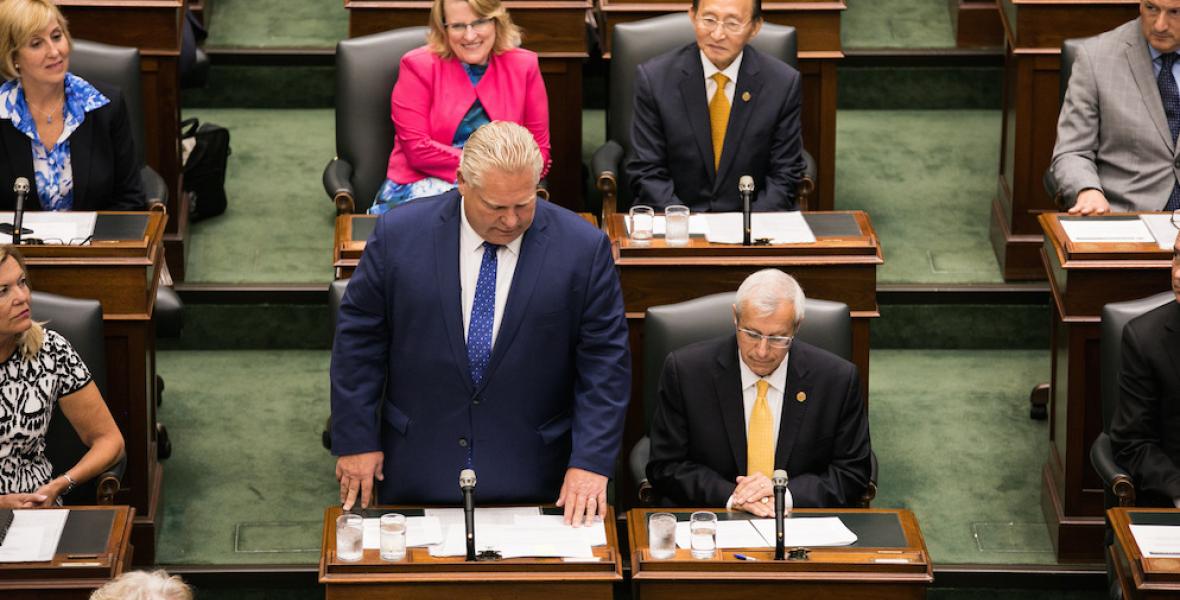Whiplash. The word our Books Editor used to characterize the news from Toronto this week. And what a week it was.
Here’s how it went down. This Monday, Ontario’s Superior Court of Justice ruled that Bill 5 — also known as the Better Local Government Act, introduced by the province and passed this summer in the legislature to reduce the number of Toronto City wards and councillors from 47 to 25 — violated voters
Charter rights to freedom of expression.
Our politics reporter, Karl Nerenberg, writes that Justice Edward Belobaba based his ruling on the bill’s timing — the municipal election campaign period was already well underway, within the 47-ward framework, when Ford introduced the bill on June 30 — and its impact on voters.
Under the 47-ward structure, Toronto’s councillors represent about 60,000 people in each ward. Ford’s legislation would result in one city councillor for every 110,000 Torontonians, which Justice Belobaba ruled would effectively undermine the right to “bring one’s grievances and concerns to the attention of one’s government representative.”
Then, just hours after the ruling, Ford whipped up a press conference to announce his government would invoke Section 33 of the Charter, the notwithstanding clause, to revive the bill and press forward with its reapproval. The provincial legislature ultimately voted to re-approve the bill just a couple of days after the debacle.
David Climenhaga argues that no one should be surprised by Ford’s use of the clause, which gives provincial governments the power to override certain portions of the Charter.
The so-called Better Local Government Act, which Ford and his backers claim is designed to save taxpayers millions and establish a more efficient government, simply puts “the premier’s thumb on the municipal electoral scales in favour of conservative politicians,” Climenhaga writes. In another piece, Climenhaga warns that we should expect more of the same: the era of notwithstanding clause restraint is officially over.
True to form, Ford continues to levy illogical, ad hominem attacks to defend his government’s actions, claiming that as a democratically elected politician, his actions represent the people over judge-made law. (Of course, the extent to which Ford can be considered “democratically elected” under our first-past-the-post electoral system is up for debate.)
Looking forward, Toronto’s municipal elections, still slated for October 22, are, understandably, a source of panic and speculation. Is Toronto’s electoral democracy totally compromised? Toronto city clerk Ulli Watkiss has said that ensuring a fair election is now “virtually impossible.”
Whiplash indeed. And this is where we need to be cautious. Ford will undoubtedly leverage Ontario’s shock to his advantage, using potentially weakened defences and a paralyzed populace as an opportunity to push his agenda forward. We can expect him to further slash social assistance, cancel the scheduled minimum wage hike, and more.
With that in mind, don’t forget to tune into rabble’s coverage of the Toronto election, which kicked off this week with Phillip Dwight Morgan’s interview with mayoral candidate Saron Gebresellassi.
And if all this news has you yearning for more philosophical ruminations on the meaning of and quest for democracy, read Doreen Nicoll‘s review of Astra Taylor’s new documentary, What Is Democracy?
In other rabble news
Still celebrating the recent court overturn of the approval for the Trans Mountain pipeline? It’s time for a more sober look at the facts. In her first article of a two-part series, Pamela Palmater outlines why the court decision actually paves the road for its eventual approval. “While Prime Minister Trudeau moans about how ‘hurt’ he is by the decision, and while the extractive industry goes into full panic mode, the only ones who need to be worried here are the Indigenous peoples and their conservation allies who will now face the full wrath of the oil industry and its federal and provincial cheerleaders,” she writes.
In environment news this week, read about the Rise for Climate actions, in which hundreds of thousands of people rose up in cities across the world to demand climate leadership and a swift, just transition to renewable energy. Read why David Suzuki thinks “disposable” is one of the worst words in the dictionary. And read Brent Patterson for a reminder on why confronting climate change must mean challenging capitalism.
Sophia Reuss is rabble’s Assistant Editor.
Help make rabble sustainable. Please consider supporting our work with a monthly donation. Support rabble.ca today for as little as $1 per month!




